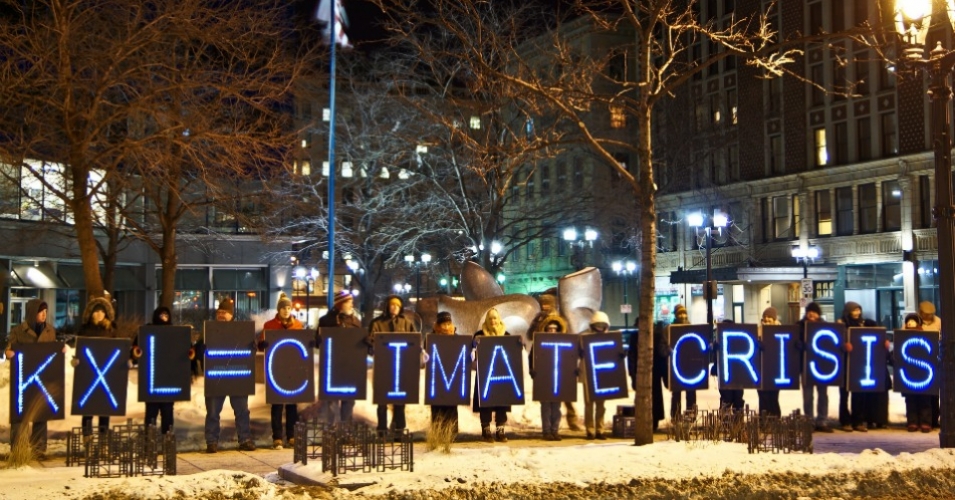Keystone XL's Climate Impact Worse Than Thought: Study
'We can't be investing in infrastructure that's going to lock in our fossil fuel reliance'

The President "is not going to be able to stay consistent or coherent with his climate commitment if we're investing in fossil fuel infrastructure," said FOE's Luísa Abbott Galvão. (Photo: Light Brigading)
The climate impacts of the proposed Keystone XL tar sands pipeline could be worse than thought, a new analysis shows.
According to the study published Sunday in the journal Nature Climate Change, completing this fossil fuel infrastructure project, which would run from Hardisty, Alberta to Steele City, Nebraska, could lead to increased oil production. That in turn will cause a decrease in global oil prices, leading to greater oil consumption, the analysis states.
"We find that for every barrel of increased production, global oil consumption would increase 0.6 barrels owing to the incremental decrease in global oil prices," the study states.
“If that’s the case, that’d be a big greenhouse-gas impact,” stated co-author Peter Erickson, a senior scientist at the Stockholm Environment Institute in Seattle, Washington.
The emissions generated as a result of the pipeline could be as much as four times greater than the State Department indicated in its Final Environmental Impact Statement (FEIS) of the project, as the authors say that the modeling used for the FEIS did not take into consideration the pipeline's impact on global oil prices.
Erickson and co-author Michael Lazarus' modeling showed that the project would lead to the release of as much as as much as 110 million tons of CO2 into the atmosphere annually. The State Department's FEIS, in contrast, found it would contribute as much as 27 million tons of CO2.
"It's obvious that Keystone XL isn't going to single-handedly cause or solve climate change," Luísa Abbott Galvão, climate and energy associate at Friends of the Earth, told Common Dreams, but it speaks to what we've "called the 'Keystone principle,' which is the idea that we can't be investing in infrastructure that's going to lock in our fossil fuel reliance."
In addition, Abbott Galvão said, "We can't forget that the implications of Keystone for climate are not just a matter of calculating direct emissions. You also have to consider the signal that this sends to markets and governments."
Friends of the Earth was among a dozen groups that sent a letter (pdf) to the State Department less than two weeks ago, writing that since the Department is open to considering other updates to its Keystone XL assessment, it should update its market assessment as well.
Abbott Galvão said that in its FEIS, the Department concludes that "tar sands development is inevitable, and if the pipeline isn't built, [tar sands are] going to somehow get out otherwise."
"We think that this is a fallacy," she said, noting a series of projects that have been canceled over lack of pipeline infrastructure. This is something the groups asked in their letter for State Depart to take note of—evidence that "Keystone XL is absolutely crucial to tar sands development."
"What this report confirms is what we've been saying all along—that because of this Keystone principle President Obama actually has all the information that he needs to make the decision already. He's not going to be able to stay consistent or coherent with his climate commitment if we're investing in fossil fuel infrastructure," she said.
http://www.commondreams.org/news/2014/08/11/keystone-xls-climate-impact-worse-thought-study